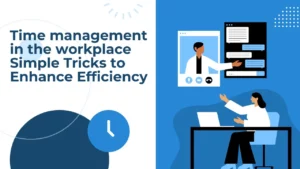Introduction
Performance anxiety is the term used to describe the anxiety that people feel before, during, and after significant tasks at work, which impairs their performance (Angelidis et al., 2019). Some amount of anxiety helps in improving our performance, but excess of it can lead to feeling overwhelmed and confused.
Workplace performance anxiety is common among working individuals in today’s fast-paced and competitive world. Individuals tend to face anxiety by the pressure to perform, whether it comes from giving a presentation, managing workloads, attending a meeting, meeting deadlines, or taking on difficult work.
Mental Health And Performance Anxiety In The Workplace
Performance anxiety can cause new challenges for the individual and have major effects on one’s mental health. It may have the following effects on mental health (Osborne et al., 2014):
- Higher stress: Performance anxiety can make individuals feel more stressed about work commitments such as expectations, performance, and meetings. When the stress becomes chronic, it leads to physiological symptoms of anxiety such as heart palpitations, shallow breaths, and difficulty in sleeping.
- Irrational dismissive thoughts: People with performance anxiety often engage in thinking of the worst scenarios and have low belief in their abilities. These constant thoughts lead to low self-esteem and confidence.
- Reduced ability to think: It also leads to people not being able to think clearly, focus on work, or make decisions. This further leads to anxiety.
- Social anxiety and withdrawal: Individuals with performance anxiety often engage in avoidance of social situations and professional commitments. For instance, absenteeism, isolating from support circles, not taking part in discussions, or disconnecting from others. This gives rise to feelings of isolation and loneliness.
- Low well-being: Chronic performance anxiety can impact all areas of one’s life, leading to mental health disorders such as depression, anxiety or panic disorder. It can also lead to a low level of well-being and low quality of life,
How does Anxiety Affect Work Performance?
Workplace performance anxiety has many impacts.
- Firstly, individuals with performance anxiety may find it hard to work with clients and colleagues. They are often too occupied with their work and may not take up more work due to their fear of failure. Such individuals are often less satisfied with their job, have low confidence, greater absenteeism, and lower job performance (Cuncic, 2023). They tend to become fixated on potential problems and precautions to take rather than completing the task at hand.
- Secondly, performance anxiety leads to individuals indulging in perfectionism and setting high expectations, which add pressure and can be overwhelming (Angelidis et al., 2019).
- Thirdly, a lot of individuals feel that their job is a part of how they view themselves. Thus, when performance anxiety kicks in, it affects not only their work productivity but also the way they view themselves and their capabilities. This leads to reduced self-esteem.
- Lastly, as discussed, when the stress becomes chronic, it may give rise to physical health issues such as headaches, fatigue, or body pains in the short run and conditions like heart-related issues of hypertension in the long run (J et al., 2023).
Apart from the employees, performance anxiety may also have an impact on organisations. If organisations do not limit the effects of performance anxiety, they will have employees who are unhappy and less productive. This could lead to employees finding it difficult to focus, communicate effectively, or engage in tasks precisely, which could result in poor performance and decreased productivity. More broadly, chronic performance anxiety can lead to distrust, animosity, competition, and fear in the workplace culture. Employee anxiety may undermine innovation and organisational performance by impacting cooperation, collaboration, and morale. Moreover, employees are more likely to change jobs when workplaces do not prioritise employee well-being (J et al., 2023).
5 Tips To Overcome Performance Anxiety At Work
Managing performance anxiety at work might be difficult, but it is possible with appropriate strategies. The following tips can help you in overcoming performance anxiety:

- Understand and identify your triggers: It is very important to pay attention to which situations trigger us. Is it giving a presentation, meeting deadlines, speaking to managers, or something else? Only if we know what triggers our anxiety can we take steps to manage and control it.
- Prepare and plan early: Performance anxiety can stem from the fear of how tasks or situations will pan out. Moreover, we tend to overestimate or underestimate certain tasks, which can add to the anxiety. Therefore, it may be helpful to break a large task into smaller and more achievable ones and create a plan of how to achieve it within the provided timeframe. For instance, practicing your presentation in front of the mirror or planning a difficult conversation so that you feel well-prepared and less anxious.
- Practice relaxation and mindfulness techniques: Relaxation techniques such as deep breathing, muscle relaxation, body scan, and meditation can help control overwhelming feelings of anxiety, and thus, incorporating these into your daily life could help in establishing equilibrium and composure. Also, instead of focusing on the past or future, it is important to be in the present moment. Mindfulness techniques help us to focus our senses on the present moment. For example, the mindful eating exercise. In this, you are required to slow down the process of eating and notice the fragrance of the food, what it tastes like, how it looks, the textures of the vessel, and how you feel after eating. This would help you draw your attention to different sensations, smells, and sounds and help you rest in the present moment, which in turn, helps manage or reduce anxiety.
- Seek support: Experiencing performance anxiety can often make us feel like we are alone. Seeking support from co-workers, family, and friends can help us feel better and lighter. Moreover, sharing your feelings may help you put things in perspective and dissect how you’re feeling. Having such conversations with your co-workers can sometimes make you realize that you are not the only one feeling overwhelmed with work and can help in establishing clear communication, trust, and a support system at work. However, if you feel that your performance anxiety is significantly disturbing your everyday life, then it may be a good idea to seek professional help from a therapist.
- Focus on yourself and practice self-care: Certain changes in your lifestyle can make you feel more energetic and prepared. Incorporating exercising, eating nutritious food, sleeping well, engaging in activities you enjoy, meeting friends and mindful meditation can help you reduce stress levels and increase resilience. Moreover, performance anxiety can lead to us not giving ourselves enough credit. Thus, celebrate small wins as well as large wins. This could be going to your favorite restaurant, shopping, or getting a relaxing massage. This will help increase your self-esteem and motivation.
Conclusion
All in all, workplace performance anxiety is even more prevalent among individuals in today’s day and age, but it can be managed. By taking proactive steps and implementing the five strategies mentioned above—understanding your triggers, preparing and planning early, practicing relaxation and mindfulness techniques, seeking support, and prioritizing self-care— one can gain control and unlock their full potential. It may take time and practice to figure out which strategies work best for you but they will help you develop the skills and confidence to manage your anxiety.
References
Angelidis, A., Solis, E., Lautenbach, F., Van Der Does, W., & Putman, P. (2019). I’m going to fail! Acute cognitive performance anxiety increases threat-interference and impairs WM performance. PLOS ONE, 14(2), e0210824. https://doi.org/10.1371/journal.pone.0210824
Cuncic, A., MA. (2023, December 6). An overview of work anxiety. Verywell Mind. https://www.verywellmind.com/work-anxiety-4692762#:~:text=Below%20are%20some%20of%20the,Noticing%20effects%20on%20personal%20life
J, Machani, Agyei, Suryanarayana, Thandayuthapani, & Lourens. (2023, July). Effects of Performance and Target Pressure on the Psychological Well-Being of Corporate Employees. Journal for ReAttach Therapy and Developmental Diversities, 6(8s), 218–227. Retrieved from https://jrtdd.com/index.php/journal/article/view/876
Osborne, M. S., Greene, D. J., & Immel, D. T. (2014). Managing performance anxiety and improving mental skills in conservatoire students through performance psychology training: a pilot study. Psychology of Well-being, 4(1). https://doi.org/10.1186/s13612-014-0018-3










